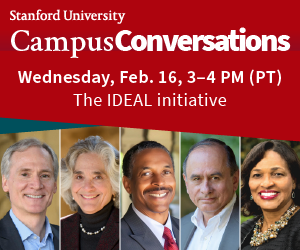Top Stanford administrators shared recent updates to the University’s Inclusion, Diversity, Equity & Access in a Learning Community (IDEAL) initiative and highlighted existing challenges to racial equity during the latest installment of Campus Conversations on Wednesday.
Launched in 2018, the IDEAL initiative is a cross-campus effort to make progress toward an inclusive, accessible, diverse and equitable University community, especially for those from traditionally marginalized identity groups. Since its inception, the initiative has launched efforts to hire a more diverse cohort of faculty and diversify both graduate and undergraduate admissions; facilitated identity/race data collection across campus; and initiated plans for campus-wide diversity, equity and inclusion training. Despite the growth of the program over the past four years, Stanford community members have questioned the initiative’s commitment to making tangible, lasting progress.
According to Provost Persis Drell, current leadership is “painfully aware of the criticism of past efforts in the area as one-offs that faded” and is committed to making sure IDEAL is about institutional change. Still, Drell said, there is significant work needed before Stanford can become the type of community that the University envisioned when it launched the initiative.
Vice Provost for Institutional Equity, Access and Community Patrick Dunkley emphasized that changes may appear slower than originally expected, but that it is on leadership to give advocates in Stanford’s marginalized communities a reason to believe in the efforts.
IDEAL recently published the findings of a campus climate diversity, equity and inclusion survey that showed the widespread and disproportionate impact of discrimination on marginalized communities at Stanford. Dunkley said the results and statistics were not shocking and that the committee planned on following up with a community-centered goal-setting process where every community center would partake in making goals to address survey areas.
Despite the results of the survey, Dunkley said the IDEAL initiative team was encouraged by the tremendous interest in data by allied groups representing non-marginalized communities who asked him about ways to effect change.
Vice Provost for Faculty Development, Diversity and Engagement Matt Snipp also emphasized the University’s excitement about the new faculty director for the Martin Luther King Research and Education Institute, Lerone Martin, who began his post in January.
Snipp said that he hopes Martin will be able to empower the King Institute to reach its potential. “The King Institute should be a global destination and a leader for the study and public understanding of the works of Reverend Martin Luther King Jr. and their relevance to contemporary global society,” Snipp said.
Snipp also said a second cohort of IDEAL postdoctoral fellows would be invited to Stanford soon.
Senior Advisor to the Provost on Equity and Inclusion Shirley Everett shared recent progress in the University’s efforts to prioritize diversity in recruiting. IDEAL is currently developing what it calls its “learning journey,” a staff training on equity and diversity intended to help foster more inclusive recruiting practices.
“My hope is that IDEAL becomes the foundation on which we build an equitable ecosystem so all staff can bring their full authentic self to work,” Everett said.
While administrators highlighted the value of including and appreciating the perspectives of stakeholders in issues of equity on campus, those in attendance raised concerns about the initiative’s willingness to serve the Stanford community. One community member highlighted the use of intimidation tactics by managing supervisors in higher education, pointing out how reports of wrongdoing have often been overlooked at universities across the country.
Stanford President Marc Tessier-Lavigne said that intimidation tactics are unacceptable, adding that it is important to elevate such reports even beyond human resources in some situations.
“It’s distressing to me to hear that the questioner feels that the issues they have experienced and have raised are not being addressed,” Tessier-Lavigne said. “That is certainly not the Stanford we want to be.”
For IDEAL administrators and leaders throughout the University to make a positive change to the campus community, they must look inward and face the problems they identify head-on, Tessier-Lavigne said.
“The willingness to engage in dialogue is the foundation for communicating and listening across differences” he said, adding that “it is an essential condition for the success of everything we’re trying to do.”
This article has been corrected to reflect the learning journey is not mandatory. The Daily regrets this error.
